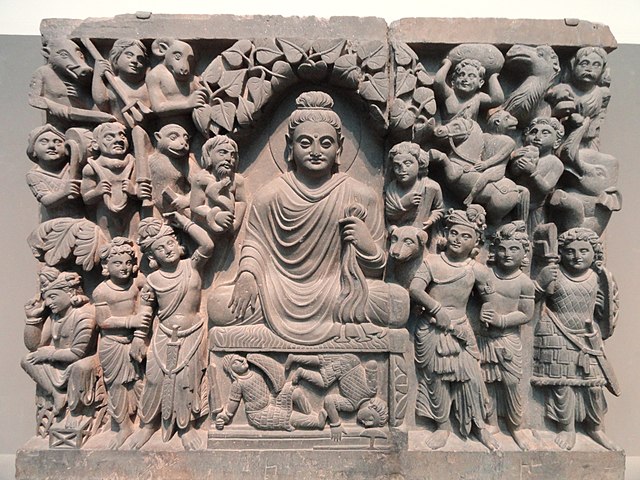In Buddhism, faith refers to a serene commitment to the practice of the Buddha's teaching, and to trust in enlightened or highly developed beings, such as Buddhas or bodhisattvas. Buddhists usually recognize multiple objects of faith, but many are especially devoted to one in particular, such as one particular Buddha. Faith may not only be devotion to a person, but exists in relation to Buddhist concepts like the efficacy of karma and the possibility of enlightenment.
The disciple Ānanda (at left) is the traditional example of the faithful disciple of the Buddha.
The saṅgha is described as a "field of merit", because Buddhists regard offerings to them as particularly karmically fruitful.
Buddhist stūpa in Kesariya, Bihar, India, erected in honour of the Kalāma Sutta
The Buddha states in several discourses, including the Vimaṁsaka Sutta, that his disciples should investigate even him as to whether he really is enlightened and pure in conduct, by observing him for a long time.
Buddhism, also known as Buddha Dharma and Dharmavinaya, is an Indian religion and philosophical tradition based on teachings attributed to the Buddha. It is the world's fourth-largest religion, with over 520 million followers, known as Buddhists, who comprise seven percent of the global population. Buddhism originated in the eastern Gangetic plain as a śramaṇa–movement in the 5th century BCE, and gradually spread throughout much of Asia via the Silk Road.
Mayadevi Temple marking the Buddha's birthplace in Lumbini
Enlightenment of Buddha, Kushan dynasty, late 2nd to early 3rd century CE, Gandhara
The Buddha teaching the Four Noble Truths. Sanskrit manuscript. Nalanda, Bihar, India
Traditional Tibetan Buddhist Thangka depicting the Wheel of Life with its six realms








